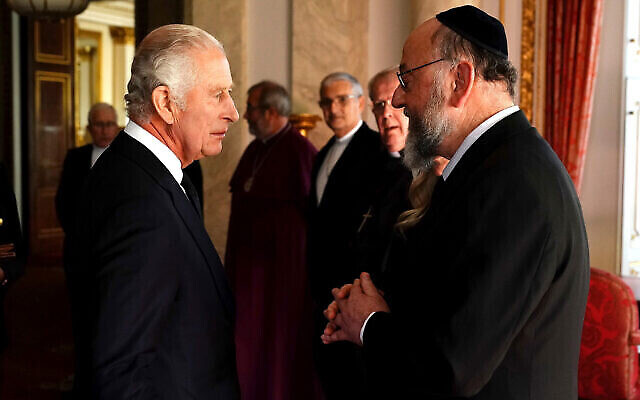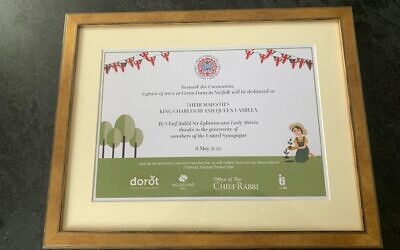Chief’s St James Palace sleepover: ‘Someone walked ahead so we didn’t trigger the lights’
Sir Ephraim and his wife, Lady Valerie, were hosted at St James’ Palace on Friday night and Saturday so he could observe Shabbat and attend the Coronation service at the Abbey.
Jenni Frazer is a freelance journalist

The Chief Rabbi, Sir Ephraim Mirvis, has told Jewish News he “was not prepared” for his response to seeing the King and Queen immediately after they had been crowned in Westminster Abbey on Saturday.
He said: “Where I was sitting, the thrones of the King and Queen were directly in my line of sight. I was sitting in the eighth row from where that beautiful gold carpet was, that their thrones were on.
The Talmud says that royalty of flesh and blood is a reminder of royalty of the heavens, meaning that when you see human royalty, it reminds us of how great God is. And obviously the King of Kings is of a far superior nature.
“But when I saw, literally in front of me, the King and Queen with their crowns on, at that moment — it was something very, very special. There was an aura about it, it was palpable, it was just there, and you could sense it. And that was something I wasn’t prepared for: it just came, and was very powerful. So it was an enormous privilege for me to be there at that moment, to represent our community”.
Sir Ephraim and his wife, Lady Valerie, were hosted at St James’ Palace on Friday night and Saturday in order that he could both observe Shabbat and attend the Coronation service at the Abbey.
WATCH: The most diverse coronation in history saw the Chief Rabbi join other faith leaders in blessing the King and former @BoardofDeputies CEO Gillian Merron present ceremonial robes to the Monarch. The King added a reference to people of “every faith and belief”. #Coronation pic.twitter.com/W3lVM4OEJY
— Jewish News (@JewishNewsUK) May 6, 2023
The Chief Rabbi was full of praise for his palace hosts, whose staff, he said, “had really done their homework” and had gone out of their way to make things comfortable for Sir Ephraim and Lady Valerie. For example, he said, there were some rooms in which a light came on automatically when a person walked in. “The palace ensured that there was always someone to walk ahead of us so that we played no part in triggering the light”.
He said he had “a sense of deep privilege for the respect being shown to the British Jewish community. I felt enormous appreciation for our gracious hosts”.
While Chief Rabbi Mirvis would not go into specific details about “a Shabbat like no other”, he did pay tribute to the church leaders who made clear to him their awareness of Shabbat. “Yes, it was a Coronation — but it was also Shabbat”.
There was an aura about it, it was palpable, it was just there, and you could sense it. And that was something I wasn’t prepared for: it just came, and was very powerful.
On Friday night the Chief Rabbi attended a packed service at Central Synagogue, while on Shabbat morning he prayed at a 6am service at Western Marble Arch, with a similarly “enormous attendance”.
 And then came the walk to Westminster Abbey. “The last time there was a Coronation on Shabbat was 1902 [for King Edward VII] and Chief Rabbi Herman Adler attended. The Palace wanted me, literally to walk in the footsteps of Chief Rabbi Adler”, so the route was planned and copied accordingly, after Sir Ephraim had made kiddush at St James’ Palace.
And then came the walk to Westminster Abbey. “The last time there was a Coronation on Shabbat was 1902 [for King Edward VII] and Chief Rabbi Herman Adler attended. The Palace wanted me, literally to walk in the footsteps of Chief Rabbi Adler”, so the route was planned and copied accordingly, after Sir Ephraim had made kiddush at St James’ Palace.
All along the route Sir Ephraim could hear shouts of “Shalom” and “Shabbat shalom” — joking that the first cries came from non-Jews and the second from Jews.
The Chief Rabbi said he was not surprised at the heavy emphasis on Christian theology in the Coronation service, and though “not that familiar” with Christian liturgy, he was also not surprised at the several references to Judaism — including a blessing made by the Archbishop of York, which is a direct repetition of the blessing of the Cohenim — “The Lord bless you and keep you; the Lord make his face to shine on you and be gracious to you; the Lord turn his face toward you and give you peace”.
All along the route Sir Ephraim could hear shouts of “Shalom” and “Shabbat shalom” — joking that the first cries came from non-Jews and the second from Jews.
At the end of the Coronation, as the king and queen were leaving the Abbey, one last acknowledgment of Shabbat as the Chief Rabbi and other faith leaders spoke a greeting to King Charles III that was deliberately without benefit of a microphone. The religious leaders told the king: “Your majesty, as neighbours in faith we acknowledge the value of public service. We unite with people of all faiths and beliefs in thanksgiving, and give service with you for the common good”.
For the Chief Rabbi, it was back to the Palace for “a wonderful Shabbes lunch and then a seudah shlishit” before going to daven mincha and then return home. For the Mirvises, it was a cause of wonder if so many Shabbat events — candle-lighting, kiddush, the seudah — had ever taken place in a royal household. Each one was almost certainly a milestone and a first.
Finally, what — as the Chief Rabbi noted — do you buy for the man (and woman) who has everything? In keeping with King Charles’ own well-documented passion for the environment — and Sir Ephraim’s own “deep concern for a safer and more protected planet” — the plan is to plant a grove of trees in the royal couple’s names, in the United Synagogue’s Dorot Forest in Norfolk. “We thought it would be appropriate”.
He added: “It wasn’t us personally, it was the Jewish community that was being honoured, and I feel very privileged that I had that role. What we experienced was on behalf of everyone” — though, with a smile, he agreed that his royal experience had its roots in the close relationship he had built with the King over many years.

Thank you for helping to make Jewish News the leading source of news and opinion for the UK Jewish community. Today we're asking for your invaluable help to continue putting our community first in everything we do.
For as little as £5 a month you can help sustain the vital work we do in celebrating and standing up for Jewish life in Britain.
Jewish News holds our community together and keeps us connected. Like a synagogue, it’s where people turn to feel part of something bigger. It also proudly shows the rest of Britain the vibrancy and rich culture of modern Jewish life.
You can make a quick and easy one-off or monthly contribution of £5, £10, £20 or any other sum you’re comfortable with.
100% of your donation will help us continue celebrating our community, in all its dynamic diversity...
Engaging
Being a community platform means so much more than producing a newspaper and website. One of our proudest roles is media partnering with our invaluable charities to amplify the outstanding work they do to help us all.
Celebrating
There’s no shortage of oys in the world but Jewish News takes every opportunity to celebrate the joys too, through projects like Night of Heroes, 40 Under 40 and other compelling countdowns that make the community kvell with pride.
Pioneering
In the first collaboration between media outlets from different faiths, Jewish News worked with British Muslim TV and Church Times to produce a list of young activists leading the way on interfaith understanding.
Campaigning
Royal Mail issued a stamp honouring Holocaust hero Sir Nicholas Winton after a Jewish News campaign attracted more than 100,000 backers. Jewish Newsalso produces special editions of the paper highlighting pressing issues including mental health and Holocaust remembrance.
Easy access
In an age when news is readily accessible, Jewish News provides high-quality content free online and offline, removing any financial barriers to connecting people.
Voice of our community to wider society
The Jewish News team regularly appears on TV, radio and on the pages of the national press to comment on stories about the Jewish community. Easy access to the paper on the streets of London also means Jewish News provides an invaluable window into the community for the country at large.
We hope you agree all this is worth preserving.





















